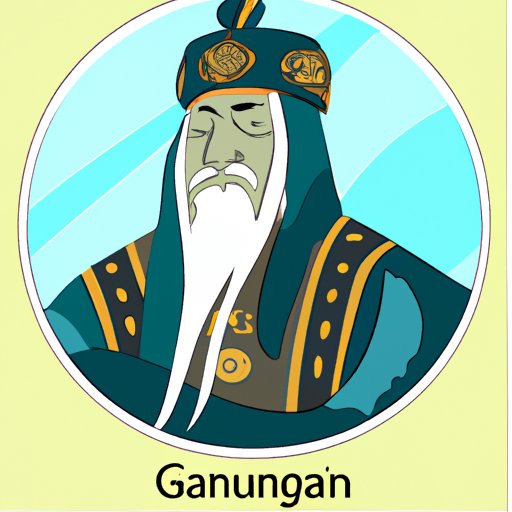Introduction
Genghis Khan (1162-1227) is one of the most famous and influential leaders in history, known for his military prowess and leadership skills. He founded the Mongol Empire, which eventually became the largest continuous land empire in history, stretching from Eastern Europe to South East Asia. He is considered by many to be one of the greatest leaders of all time.
In this article, we will explore why Genghis Khan was such a great leader, looking at his leadership qualities, military tactics, and legacy. We will examine how he was able to unify warring tribes, establish trade routes, develop a legal code, allow for religious tolerance, respect women’s rights, and promote justice and fairness.

Leadership Qualities of Genghis Khan
Genghis Khan was an incredibly talented leader, with a number of impressive qualities. He was a visionary, able to see far into the future and plan accordingly. He was also charismatic, inspiring loyalty and devotion from those around him. Finally, he was courageous, willing to take risks in order to achieve his goals.
These qualities made him an effective leader, enabling him to build an empire that spanned much of the world. He was able to bring together disparate groups of people and inspire them to work towards a common goal.

His Military Tactics and Strategies
Genghis Khan was also known for his military tactics and strategies. He was flexible and adaptive, able to adjust his plans in response to changing conditions on the battlefield. He was also skilled at psychological warfare, using fear and intimidation to demoralize his enemies.
He was also adept at logistics, ensuring that his troops were well supplied and able to move quickly. He was able to outmaneuver his opponents and keep them off balance, allowing him to win many battles.

His Ability to Unite Warring Tribes
Genghis Khan was also successful in uniting warring tribes. He used diplomacy to negotiate peace between rival factions and reward those who remained loyal to him. He also used fear and intimidation to quell any dissent and ensure his rule was absolute.
By uniting these tribes, he was able to consolidate the Mongol Empire and expand its borders. This enabled him to establish trade routes, bringing wealth and prosperity to the region.
His Legacy of Expansion
Genghis Khan’s legacy of expansion is one of the most lasting aspects of his reign. He was able to establish trade routes throughout the region, providing economic benefits to the people. He also developed a legal code, ensuring that justice was served and that citizens were treated fairly.
The expansion of the Mongol Empire also led to increased cultural exchange, as new ideas and technologies were shared between different regions. This helped to spread knowledge and advance civilization.
His Religious Tolerance
Genghis Khan was also known for his religious tolerance. He respected other religions and allowed people to practice their own faith. He also encouraged dialogue between different faiths, promoting understanding and cooperation.
This helped to create a more peaceful and prosperous society, as different religions were able to coexist without fear of persecution or discrimination.
His Respect for Women
Genghis Khan was also known for his respect for women. He granted them rights that were unheard of at the time, including the right to inherit property and the right to divorce. He also allowed women to participate in politics and hold positions of power.
This helped to elevate the status of women in society, creating a more egalitarian environment for everyone.
His Commitment to Justice and Fairness
Genghis Khan was also committed to justice and fairness. He established a merit-based system, rewarding those who worked hard and punishing those who did not. He also sought to ensure that everyone was treated equally, regardless of their social status.
This commitment to justice and fairness helped to ensure that the Mongol Empire was stable and prosperous.
Conclusion
Genghis Khan was a great leader who had a number of impressive qualities, including vision, charisma, courage, flexibility, and the ability to unite warring tribes. He also established trade routes, developed a legal code, allowed for religious tolerance, respected women’s rights, and was committed to justice and fairness.
His legacy lives on today, as his leadership skills and tactical acumen are still studied and admired by many. He remains one of the most influential leaders in history, and his impact can still be felt in modern times.
(Note: Is this article not meeting your expectations? Do you have knowledge or insights to share? Unlock new opportunities and expand your reach by joining our authors team. Click Registration to join us and share your expertise with our readers.)
